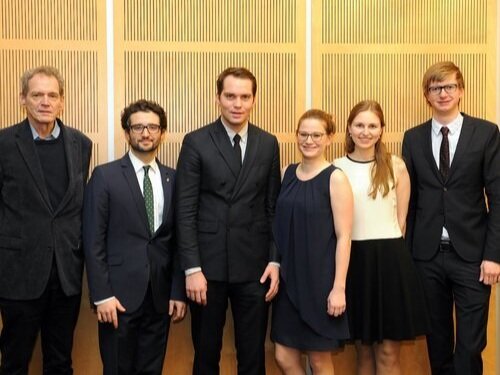Obermayer German Jewish History Award
Irene Corbach
Cologne, Northrhine-Westfalia
Without Irene and Dieter Corbach, the name Erich Klibansky would have faded away. A teacher in the 1930s at the Jawne Gymnasium—a Jewish high school in Cologne—Klibansky saved at least 130 children from the Nazis. Class by class, he sent them to England as part of the Kindertransport. He was killed in Minsk after being deported there.
Klibansky’s is just one name among dozens that the Corbachs have kept alive. Starting in the mid-1980s, the couple used their spare time to research the history of the many Jewish schools in Cologne, as well as deportations from the city. After Dieter’s death in 1994, Irene, now 65, continued the work on her own. No slow-moving bureaucracy, unwilling politician or lack of financial means has stopped her. “Due to her work, I met people whom I had thought lost,” says Fritz Bauchwitz, one of the students rescued by Klibansky.
Motivated by a strong sense of responsibility, the Corbachs—he a religion teacher, she with a small publishing business—had long promoted Christian-Jewish relations through their church. But about 20 years ago, Irene met a man at a conference who said that his father had once taught at a Jewish school in Cologne, this one on Luetzow Street. “I was shocked,” she remembers. “It could only have been the one that I had attended as a trade school.” None of her teachers had ever mentioned that part of the school’s history, she says. She decided she didn’t want other students to be ignorant of its past.
That was the starting point for the Corbachs’ research. They searched for contemporary witnesses, went to Israel, and soon made contact with people “who could still sing Cologne songs,” Irene Corbach says. They got more involved as they continued discovering Klibansky’s former pupils. “Today, she keeps in contact with almost all of the survivors from the [Jawne] high school,” Fritz Bauchwitz says. Corbach’s e-mail account now includes 700 people worldwide, all of whom receive a newsletter from her once a year. “Through my work, I’m so familiar with their stories—it’s just as if they were relatives of mine,” she says.
The exhibition “The Jawne of Cologne and a book by the same name—written by Dieter and researched by both—tells of Jewish schools in the city and about the deeds of Erich Klibansky. Places and streets have been named after him and other important personalities. A Lion of Judah fountain engraved with the names of the deported children commemorates where the Jawne School once stood. Another book begun by Dieter Corbach and finished by Irene illuminates the fate of 7,000 murdered Cologne Jews.
Irene Corbach herself has organized numerous commemoration ceremonies and discussions with contemporary witnesses about the former Jewish communities in Germany, and she serves as caretaker of the Jewish cemeteries in Cologne. Friends say she is also a determined researcher who has helped many to find out more about their families. “In an old-fashioned way, she goes directly to people when they need help,” says Helga Fritz. “She doesn’t think about it a long time or make long discussions. She just does it.”
Corbach relates her experiences doing research in a calm, quiet way. But her manner masks an enduring persistence that runs through her work, as well. Three years ago, Cologne officials rejected her proposal to erect a monument in the Muelheim district that would commemorate the former Jewish inhabitants of that area. Yet she has continued writing letters and prodding officials. “Those politicians will be out of office some day,” she says, “and I already have 80 names for the monument.”
THIS WALL BRINGS PEOPLE TOGETHER
Students at this Berlin elementary school, built on the site of a synagogue, have been building a wall for the past two decades. It delivers a powerful message about community.
STUDENTS REACHING STUDENTS
When a handful of ninth graders from Berlin met Rolf Joseph in 2003, they were inspired by his harrowing tales of surviving the Holocaust. So inspired that they wrote a popular book about his life. Today the Joseph Group helps students educate each other on Jewish history.
“I SPEAK FOR THOSE WHO CANNOT SPEAK”
Margot Friedländer’s autobiography details her struggles as a Jew hiding in Berlin during World War II. Now 96, she speaks powerfully about the events that shaped her life and their relevance today.



